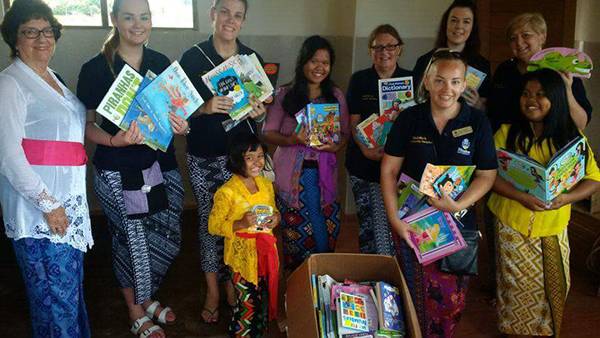
Five students from Flinders University’s Disability and Community Inclusion Unit are gaining real-world experience through their first overseas field placement at PUSPADI Bali, an NGO supporting more than 4,500 people with disabilities in Bali and Eastern Indonesia.
Associate Professor Caroline Ellison and the students from across regional Australia have been doing a five week field placement at PUSPADI Bali, where they’re learning about the increasing need for more high-quality support for local people with disabilities in a developing country.
The partnership between the university and the NGO developed when Associate Professor Ellison and PUSPADI Bali Director I Nengah Latra met while participating in the 2015 Australian Award Fellowship between Flinders DCIU and the Ministry of Social Affairs in Indonesia. From there, they later coordinated for students to start doing field placements.
“We really value the cross-sharing of information and culture between Associate Professor Ellison, the students and the PUSPADI Bali team because we learn from each other about disability rights, as well as how people with disabilities can use their power to improve accessibility, inclusion and tolerance in their communities,”says PUSBADI Bali Director I Nengah Latra.
“From a university perspective, it’s good for students to have these diverse experiences and understand cultural sensitivities, as well as see that the world isn’t just their view but more than that,” says Associate Professor Ellison.
“During my time at PUSPADI Bali, I have noticed everyone is on an even playing field, from the way the staff respectfully interact with people with disabilities and how they’re open to us all sharing our skills and knowledge to help people who need it most,” says Flinders student Sarah Baillie.
The students are gaining a deeper understanding about disability issues through their field trips to East and North Bali with PUSPADI Bali staff, who regularly provide rehabilitation, mobility aids or wheelchairs to those in remote or inaccessible areas.
“It’s interesting to see how the PUSPADI staff have developed really good relationships with the families and community,” says another student, Nicky Byrne.
“The outreach model (in Western Australia) is something we don’t see as much because people in regional areas will travel to the city for wheelchairs or other support and if someone doesn’t have a lot of money, it can be quite hard.”
The students have also observed the contrast between the different levels of funding support for disability services in Bali and in Australia.
“We see a lot of the work that PUSPADI Bali is doing that we, who are working with disability support organisations in Australia are actually getting help with from the government, which is what makes it work and we also have the National Disability Insurance Scheme but here in Bali unfortunately, it isn’t happening as much as it does back in our country,” adds student Leigh-Anne Hodgetts.
PUSPADI Bali is based at the Annika Linden Centre which is a social incubator for NGOs providing disability support services.
Alongside field trips, the students have also been spending time in PUSPADI Bali’s workshop to learn about how high-quality prosthetics and orthotics are made as well as in the therapy and educational classes at YPK. On the courtside, they’ve also played numerous games of wheelchair basketball at Bali Sports Foundation.
Associate Professor Ellison and the students brought 300 books and childrens’ games to donate to PUSPADI Bali’s Bungaya Library and Learning Centre.
The library is set to open in August and was funded through the Australian Government’s Direct Aid Program, the fundraising efforts of Balinese and Australian teenagers Tyas Latra and Samara Welbourne, as well as donations from supporters.
During their placement, Professor Ellison and students also had the opportunity to meet with the Australian Consul to Bali Drew Boekel and Australian Consul-General to Bali Dr Helena Studdert as well as with lecturers from the Universitas Udayana in Bali.
“We value these international placements because Flinders University has a lot of students from around the ASEAN region and we believe that disability isn’t a tragedy but it’s all about diversity and acceptance,” she says.
There are plans for more Flinders University students undertaking disability studies to do further placements at PUSPADI Bali next year.

